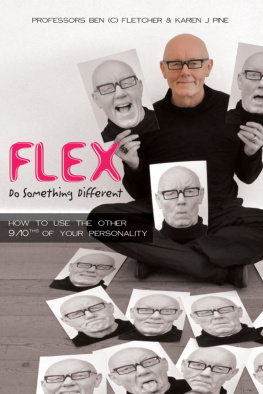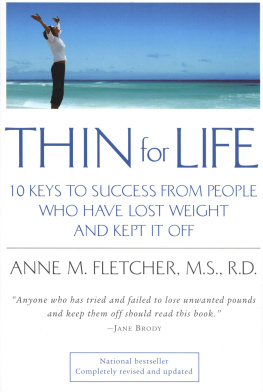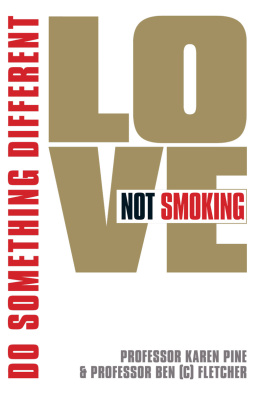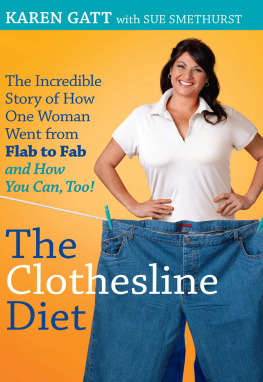
Also by the authors:
Love Not Smoking: Do Something Different
Do Something Different: The Journal
The No Diet Diet: Do Something Different
co-authored with Dr Danny Penman
Sheconomics
by Professor Karen J Pine and Simonne Gnessen
(Inner) FITness and the FIT Corporation
by Professor Ben (C) Fletcher and Bob Stead

First published in Great Britain in 2012 by:
University of Hertfordshire Press
College Lane
Hatfield
Hertfordshire
AL10 9AB
UK
Ben (C) Fletcher and Karen J Pine 2012.
The right of Ben (C) Fletcher and Karen J Pine to be identified as the authors of this work has been asserted by them in accordance with the Copyright, Designs and Patents Act 1988.
All rights reserved. No part of this book may be reproduced or utilised in any form or by any means, electronic or mechanical, including photocopying, recording or by any information storage and retrieval system, without permission in writing from the publisher.
British Library Cataloguing in Publication Data
A catalogue record for this book is available from the British Library
ISBN 978-1-907396-54-0
Design by
Whiteing Design Partnership
Tel (01582) 792215
www.whiteingdesign.co.uk
Printed in Great Britain by
CPI Antony Rowe
Preface
This book has a history. In the true spirit of flex, it is both old and new. Both mature and youthful. Many of the ideas in it stretch back, quite a way back. Even back to the times when Ben Fletcher had hair. Yes, they go back to Bens post-Oxford days when he first researched why some individuals get stressed. And back to the birth of FIT Science to revisit some of the principles that Ben wrote about, with Bob Stead, in the book (Inner) FITness & The FIT Corporation. That book is no longer in print and in any case Ben had decided that it needed bringing up to date. So, in a sense, this is the new and improved FIT handbook. But it is also so much more than that.
About the time that he realised FIT needed revamping and revitalising, bringing new thoughts to bear on the original theories, Ben had also started to express those ideas in a new, more powerful (some would say more accessible) format. That was probably from 2004 onwards, when he started working with his wife Karen Pine. Together they are the proud parents of the Do Something Different approach that makes up much of this book. Thats why the voice in the book shifts from I to we at times. The I is Ben, expounding old and new ideas and putting them into his voice. The we is the product of that thinking and the work of Ben and Karen together. Ultimately, though, Ben and Karen are a partnership, in life and in work, sharing the same views and speaking with one voice.
How to use this book
There are four sections to this book. They do have a sequence to them but we have tried to include many smaller sub-sections for the reader who prefers to dip in and out. At the end of each of the four main sections we give you ways to put the ideas into practice a flex in action section. As the theory unfolds youll see how flex is all about expanding your world and making full use of your personality, since most of us are driven by habit and use just a fraction of our potential. The more you can put the flex technique i.e. Do Something Different (DSD) into practice, the more you will experience for yourself the worlds it can open up for you.
The
concludes with the behaviour-rater a quick assessment of your own behavioural repertoire and then dozens of practical ways in which you can expand yourself and really enjoy the full experience of flex, by waking up the hitherto unused parts of your personality.
In youll find another self-assessment tool, this time the coherence-rater, to give you insight into where you can enhance your own personal coherence. This is followed by several projects to work on coherence and expand your own life.
Finally, takes flex beyond the individual and argues for the need to move towards a coherent and flexible world.
Contents
1
Section 1:
The human habit machine
1. How many kinds of people are there?
This may seem an inauspicious beginning but a pivotal point in my academic career happened in a Chinese restaurant near Hatfield, not far from where I was working at the University of Hertfordshire. It was the late 1970s. The waiter was young and eager. He made polite conversation while serving us and he found out that I was a psychologist. When I was paying the bill, he asked if I would mind answering a question for him. I said I would if I could. His question has stayed with me in the decades since because it encapsulates a common misconception about people.
The waiter asked me this:
How many kinds of people are there?
Ill tell you the answer I gave him in due course. But I did not shy away from the question. It would have been easy to sidestep it by saying something like, It depends what you mean or What definition of kinds do you have in mind? (Psychologists always carry a whole armoury of sidestepping statements around with them.) After a little discussion, though, I knew exactly what he meant. It all became clear when the word personality cropped up.
What is a reasonable answer? Given that we are all individuals, perhaps it could have been, As many kinds as there are people in the world. Or even a very large number since we are all individuals. But that does not seem to be the case. Psychologists believe they have the answer to how many kinds of people there are because, in principle, people have personalities that fit into certain categories. Psychologists can, by various ways and means, fit them into a finite number of categories usually described by between two and five personality traits. For example, in the big five these are agreeableness, conscientiousness, extroversion, neuroticism and openness to experience.
Why should this be so? Humans are habit machines and they tend to behave predictably. People tend to behave the same in different situations. It seems safe to say that, if we know someone, weve a good idea of what to expect of them. We often say, Oh, thats just typical of Bill. Or, I might have known Jenny would say that! In fact, we can even figure out something about a person we dont know very well. Just being told about Simon, who wears lizard skin shoes, might lead you to make certain assumptions about the type of person Simon is. Or hearing that Lucy reacted very badly to the criticism would help you predict how she would respond to a cutting remark in the future.
So my answer to the waiters question, How many kinds of people are there? at that time led me to tell him that empirical psychological research had come up with five big personality traits. Thats what my academic studies had taught me. But I remember also questioning the sense of dividing personality into five categories. It seemed as absurd to me as the twelve astrological signs of horoscopes. His question led me to ponder why people should be categorised. Might they not become imprisoned by the category they were assigned to? Wouldnt it be more important to be able to behave in the best and most appropriate way as required by the situation? Like a tree that bends with the wind, to have a fluid and flexible personality that could flex according to need?
Next page













